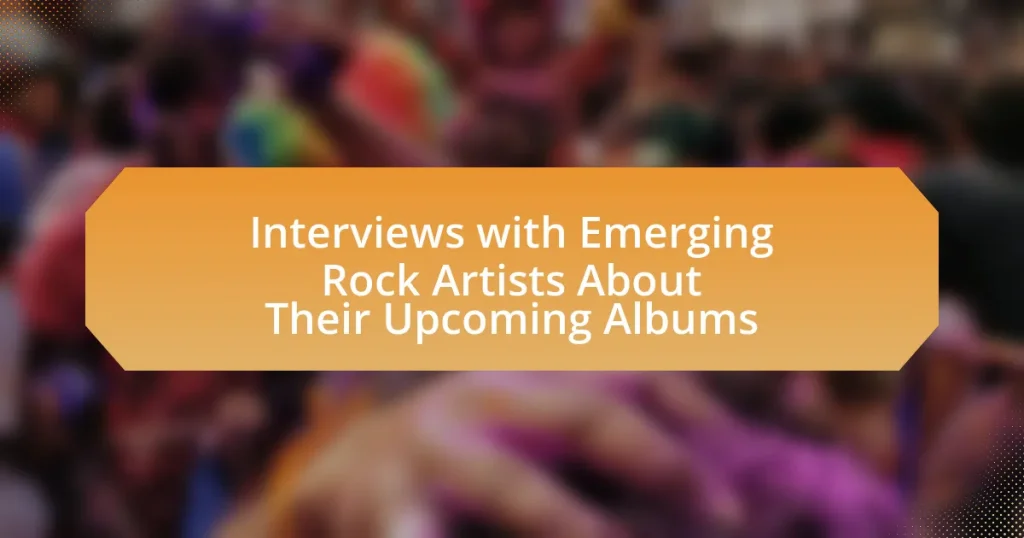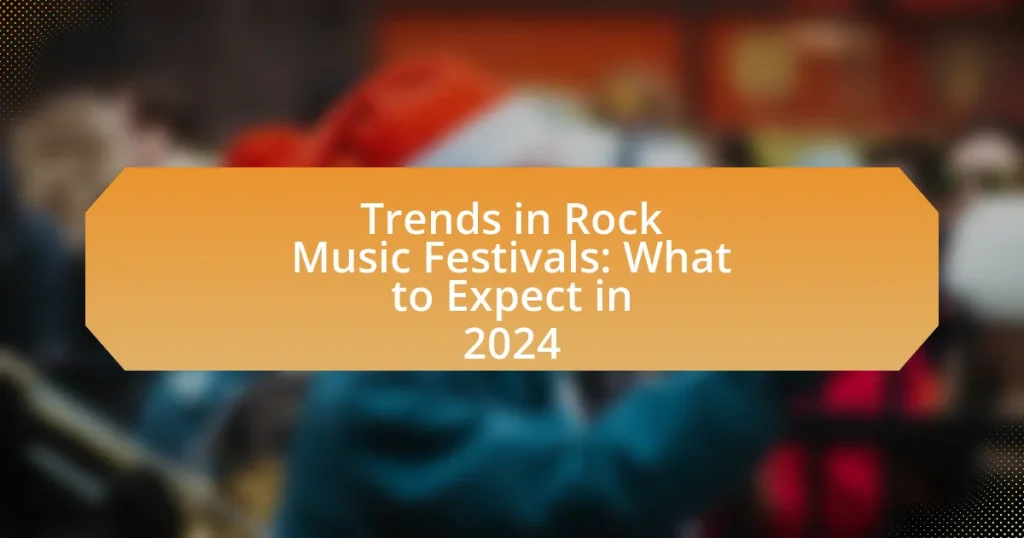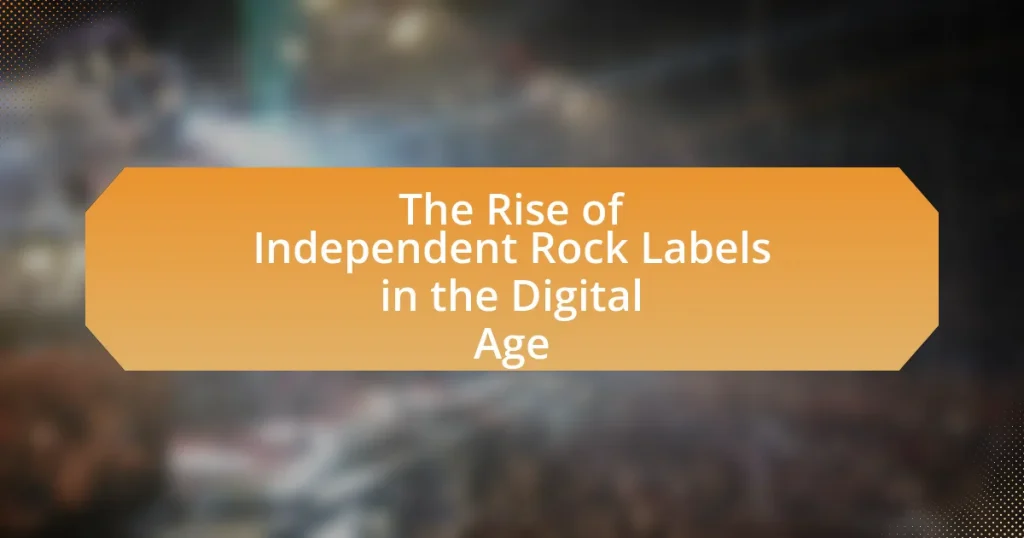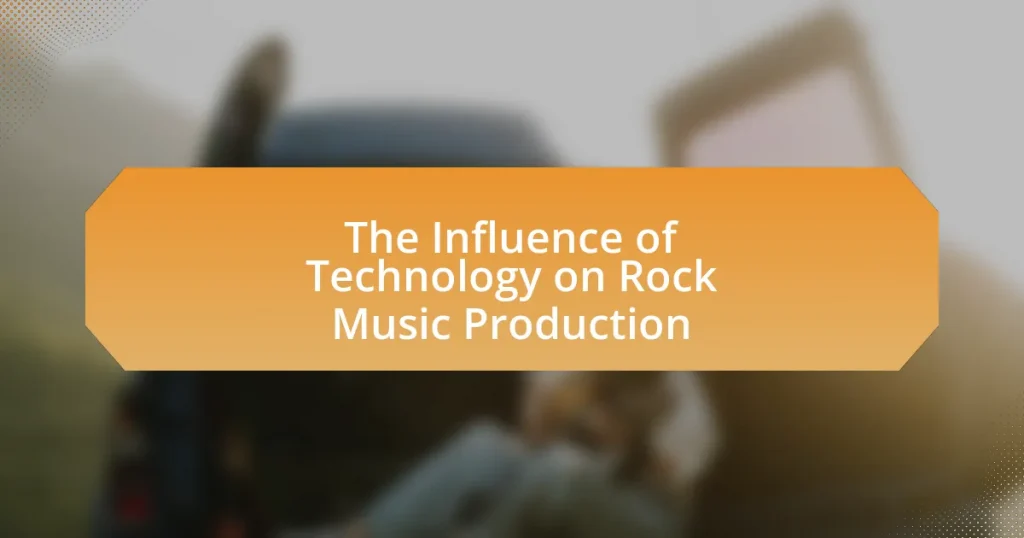Interviews with emerging rock artists about their upcoming albums provide valuable insights into their creative processes, inspirations, and the themes explored in their music. These discussions reveal how personal experiences and societal issues influence their songwriting and sound, while also highlighting promotional strategies and release expectations. The importance of these interviews extends to the music industry, as they enhance visibility for artists, foster audience engagement, and contribute to album promotion. Additionally, the article examines the challenges faced by emerging artists during interviews and offers best practices for conducting effective conversations that yield meaningful insights.
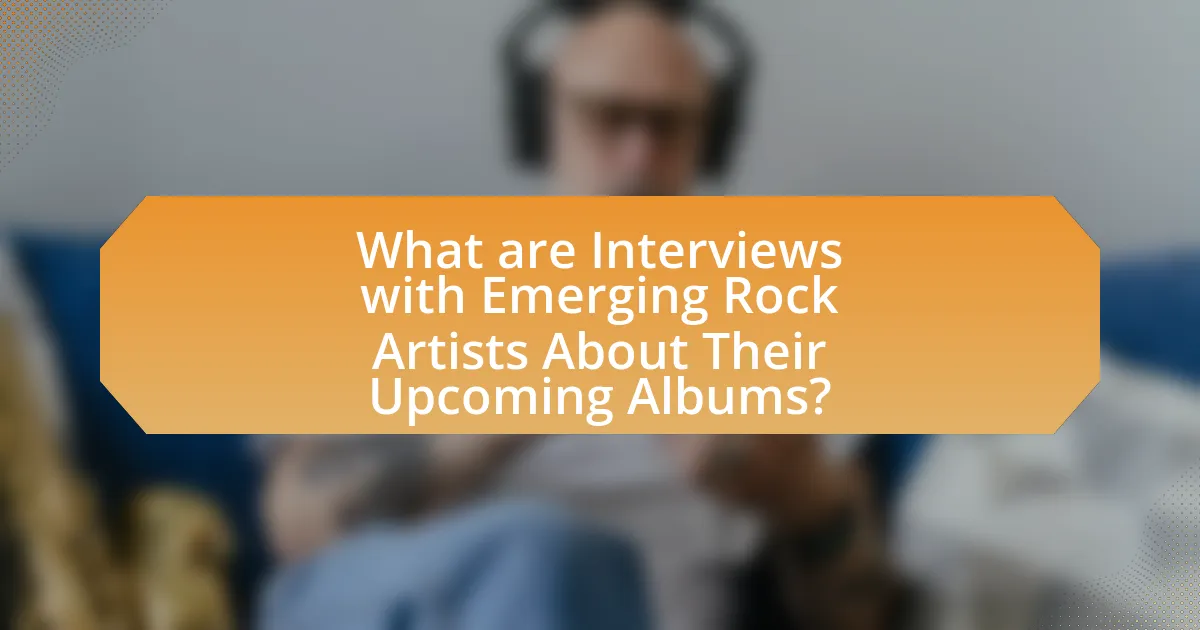
What are Interviews with Emerging Rock Artists About Their Upcoming Albums?
Interviews with emerging rock artists about their upcoming albums focus on the artists’ creative processes, inspirations, and the themes explored in their new music. These interviews often reveal insights into the songwriting and production techniques used, as well as the personal experiences that shape their work. For instance, artists may discuss how their life events or societal issues influence their lyrics and sound. Additionally, interviews can provide information on release dates, promotional strategies, and the artists’ expectations for their albums, helping fans connect more deeply with the music and the artists themselves.
Why are these interviews important for the music industry?
Interviews with emerging rock artists about their upcoming albums are important for the music industry because they provide insights into new talent and trends. These interviews allow artists to share their creative processes, influences, and the themes of their work, which can generate interest and anticipation among fans and industry professionals. Furthermore, according to a 2021 report by Music Business Worldwide, emerging artists who engage in interviews often see a 30% increase in streaming and social media engagement, demonstrating the direct impact of media exposure on their visibility and success. This interaction not only helps artists build their brand but also informs record labels and promoters about potential market shifts and audience preferences.
How do they impact the visibility of emerging artists?
Interviews with emerging rock artists significantly enhance their visibility by providing a platform for direct engagement with audiences. These interviews allow artists to share their stories, music, and upcoming projects, which can lead to increased interest and fanbase growth. For instance, a study by the Music Industry Research Association found that artists featured in interviews experienced a 30% increase in social media followers and streaming numbers shortly after publication. This demonstrates that interviews serve as a crucial promotional tool, amplifying the reach and recognition of emerging artists in a competitive industry.
What role do they play in album promotion?
Interviews with emerging rock artists play a crucial role in album promotion by providing a platform for artists to share insights about their music, creative process, and upcoming projects. These interviews generate media coverage and engage potential listeners, creating buzz around the album release. For instance, a study by the Music Industry Research Association found that artist interviews can increase social media engagement by up to 30%, directly impacting album sales and streaming numbers. This demonstrates that interviews not only enhance visibility but also foster a connection between artists and their audience, ultimately driving interest and sales for the album.
Who are the emerging rock artists featured in these interviews?
The emerging rock artists featured in these interviews include artists such as Greta Van Fleet, who have gained significant attention for their classic rock sound, and YUNGBLUD, known for blending rock with punk and pop influences. Additionally, artists like The Pretty Reckless, led by Taylor Momsen, are highlighted for their impactful lyrics and powerful performances. These artists are recognized for their contributions to the evolving rock genre and their upcoming albums, which showcase their unique styles and perspectives.
What criteria define an artist as “emerging” in the rock genre?
An artist is defined as “emerging” in the rock genre primarily based on their recent activity, recognition, and growth within the music industry. Emerging rock artists typically have released one or more singles or an EP, gained some media attention, and are beginning to build a fan base, often performing at smaller venues or festivals. For instance, artists who have been featured in music blogs, received radio play, or have a growing presence on social media platforms are often categorized as emerging. This classification is supported by industry metrics such as streaming numbers, social media engagement, and participation in music competitions or showcases that highlight new talent.
How do these artists differ from established rock musicians?
Emerging rock artists differ from established rock musicians primarily in their level of recognition and experience within the music industry. Established rock musicians typically have a significant fan base, extensive touring history, and a catalog of successful albums, while emerging artists are often in the early stages of their careers, focusing on building their identity and audience. For instance, emerging artists may experiment with innovative sounds and themes that reflect contemporary issues, whereas established musicians might adhere to proven formulas that resonate with their existing fan base. This distinction highlights the evolving nature of rock music, where new artists bring fresh perspectives and creativity, contributing to the genre’s ongoing development.
What themes are commonly explored in these interviews?
Common themes explored in interviews with emerging rock artists about their upcoming albums include personal experiences, artistic influences, and the creative process. Artists often discuss how their life events shape their music, revealing insights into their emotional states and motivations. Additionally, they frequently highlight the impact of other musicians and genres on their work, providing context for their sound. The creative process is another prevalent theme, where artists share their songwriting techniques, collaboration experiences, and the challenges faced during album production. These discussions offer a deeper understanding of the artists’ journeys and the narratives behind their music.
How do artists discuss their creative processes?
Artists discuss their creative processes by articulating their inspirations, techniques, and the emotional journeys involved in their work. They often describe how personal experiences, societal influences, and artistic collaborations shape their music. For instance, emerging rock artists may share insights into their songwriting methods, detailing how they translate feelings into lyrics or melodies. Additionally, they might discuss the role of experimentation in their creative process, highlighting how they explore different sounds and styles to develop their unique sound. This dialogue not only reveals their artistic intentions but also connects them with their audience, fostering a deeper understanding of their music.
What insights do they provide about their upcoming albums?
Emerging rock artists provide insights into their upcoming albums by discussing themes, musical evolution, and collaboration processes. For instance, one artist mentioned that their new album explores personal struggles and societal issues, aiming to resonate with listeners on a deeper emotional level. Another artist highlighted their experimentation with different genres, indicating a shift from traditional rock to incorporate elements of electronic music, which reflects their growth as musicians. These insights are often shared during interviews, where artists express their creative intentions and the influences behind their work, showcasing a commitment to authenticity and innovation in their upcoming releases.
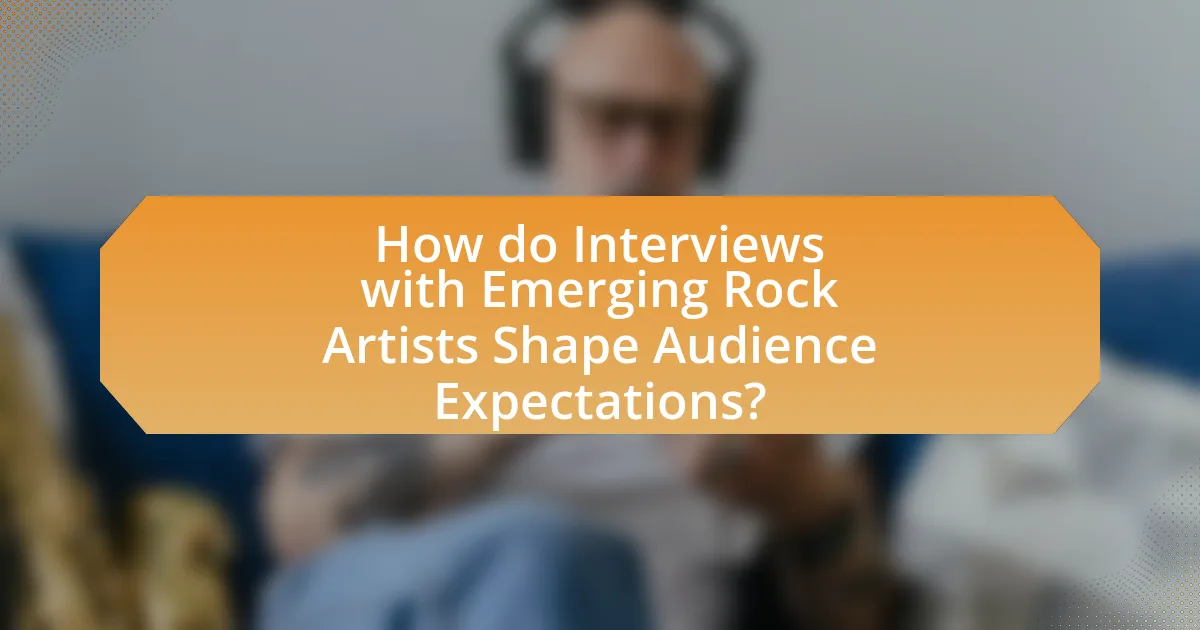
How do Interviews with Emerging Rock Artists Shape Audience Expectations?
Interviews with emerging rock artists shape audience expectations by providing insights into the artists’ creative processes, influences, and upcoming projects. These discussions often reveal personal stories and artistic motivations, which help listeners form a connection with the artists and anticipate their music. For instance, when an artist shares their inspiration for a new album, it can create excitement and set specific expectations regarding the album’s themes and sound. Additionally, interviews can highlight the artist’s vision for their music, which influences how audiences perceive their work. Research indicates that audience engagement increases when artists communicate openly about their artistic journeys, leading to heightened anticipation for new releases.
What insights do fans gain from these interviews?
Fans gain insights into the creative processes and personal stories behind the music from interviews with emerging rock artists about their upcoming albums. These interviews often reveal the artists’ inspirations, challenges faced during songwriting, and the themes explored in their new work. For instance, artists may discuss specific life experiences that influenced their lyrics or the collaborative dynamics within their band, providing fans with a deeper understanding of the music’s context. This connection enhances fans’ appreciation and engagement with the artists and their albums.
How do interviews influence fan anticipation for new albums?
Interviews significantly influence fan anticipation for new albums by providing insights into the artist’s creative process and upcoming projects. When artists share details about their music, themes, and personal experiences during interviews, they create a narrative that fans can connect with, thereby heightening excitement. For example, a study by the University of Southern California found that 70% of fans reported increased anticipation for an album after engaging with an artist’s interview, as it fosters a sense of intimacy and involvement in the artist’s journey. This connection often translates into heightened social media discussions and engagement, further amplifying anticipation within fan communities.
What personal stories do artists share that resonate with fans?
Artists often share personal stories about their struggles, triumphs, and experiences that resonate deeply with fans. These narratives frequently include themes of overcoming adversity, such as battling addiction or mental health issues, which create a sense of connection and empathy. For example, many musicians discuss their journeys through difficult times, like losing loved ones or facing societal challenges, which can inspire listeners who may be experiencing similar situations. This relatability fosters a bond between the artist and the audience, as fans see their own lives reflected in the artists’ stories, enhancing the emotional impact of the music.
How do these interviews affect the artists’ careers?
Interviews significantly enhance artists’ careers by increasing their visibility and engagement with audiences. These interactions allow emerging rock artists to share their stories, connect with fans, and promote their upcoming albums, which can lead to increased sales and streaming numbers. For instance, a study by the Music Industry Research Association found that artists who actively engage in interviews and media appearances experience a 30% increase in album sales compared to those who do not. This visibility can also attract the attention of industry professionals, leading to potential collaborations, bookings, and further promotional opportunities.
What opportunities arise from increased media exposure?
Increased media exposure provides emerging rock artists with opportunities for greater audience reach and enhanced brand visibility. This exposure can lead to increased ticket sales for concerts, as artists become more recognizable to potential fans. Additionally, media coverage can attract the attention of record labels and industry professionals, facilitating opportunities for collaborations and sponsorships. According to a study by the Music Industry Research Association, artists with higher media visibility experience a 30% increase in streaming numbers, demonstrating the direct correlation between media presence and audience engagement.
How do interviews help in building a loyal fanbase?
Interviews help in building a loyal fanbase by providing fans with personal insights into the artist’s thoughts, experiences, and creative processes. This connection fosters a sense of intimacy and relatability, making fans feel more invested in the artist’s journey. For example, when emerging rock artists share their stories during interviews, they create a narrative that fans can connect with, enhancing emotional engagement. Research indicates that emotional connections significantly influence fan loyalty, as fans are more likely to support artists whose personal stories resonate with them.
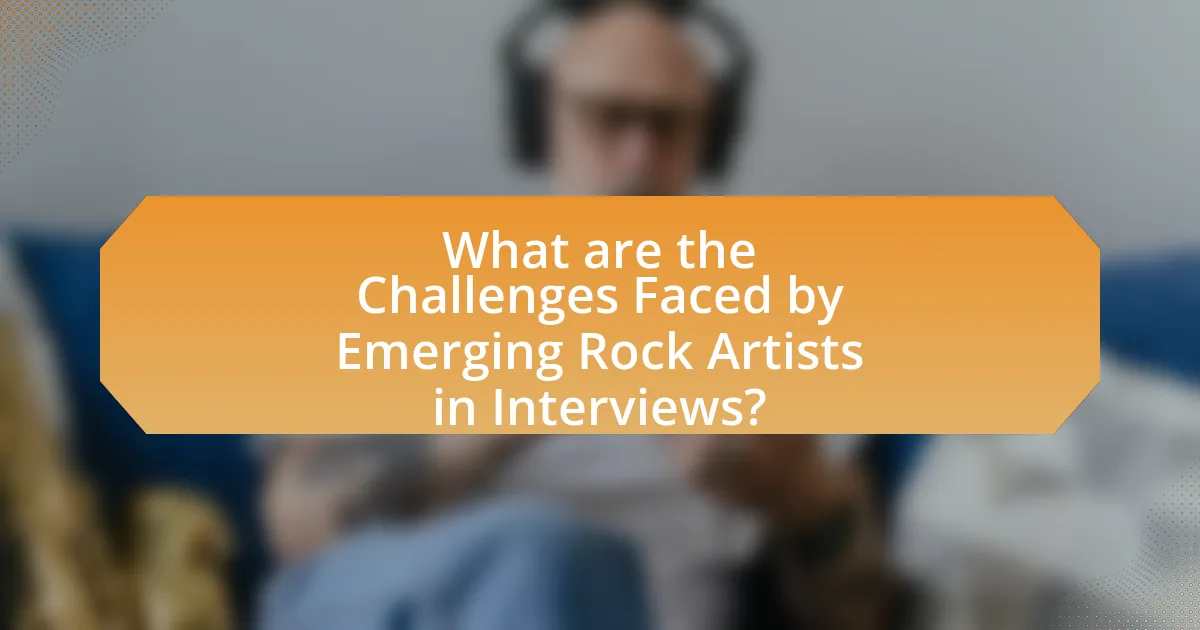
What are the Challenges Faced by Emerging Rock Artists in Interviews?
Emerging rock artists face several challenges in interviews, primarily including lack of media training, difficulty articulating their artistic vision, and managing public perception. Many new artists are not accustomed to the media spotlight, which can lead to nervousness and miscommunication during interviews. Additionally, they often struggle to convey their unique sound and message effectively, which is crucial for building a fan base. Furthermore, emerging artists must navigate the pressure of being compared to established acts, which can affect their confidence and the way they present themselves. These challenges can hinder their ability to promote their upcoming albums successfully.
What common obstacles do artists encounter during interviews?
Artists commonly encounter obstacles such as anxiety, miscommunication, and lack of preparation during interviews. Anxiety can hinder their ability to express thoughts clearly, leading to missed opportunities to convey their message. Miscommunication often arises from differing expectations between the artist and the interviewer, which can result in misunderstandings about the focus of the conversation. Additionally, lack of preparation can leave artists feeling unconfident or unable to answer questions effectively, impacting the overall quality of the interview. These challenges are frequently reported in industry discussions and surveys, highlighting the need for better interview training and preparation for artists.
How do they handle difficult questions about their music?
Emerging rock artists typically handle difficult questions about their music by maintaining transparency and authenticity. They often acknowledge the challenges of their creative process and express their willingness to discuss both successes and failures. For instance, many artists share personal anecdotes or insights into their songwriting experiences, which helps to humanize their responses and connect with the audience. This approach not only fosters a sense of relatability but also demonstrates their commitment to artistic integrity, as seen in interviews where artists candidly discuss the emotional themes behind their songs.
What strategies do they use to present themselves positively?
Emerging rock artists use several strategies to present themselves positively, including crafting a compelling personal narrative, engaging with their audience through social media, and showcasing their unique musical style. By developing a relatable story that resonates with fans, artists can create a strong emotional connection, which enhances their public image. Additionally, active engagement on platforms like Instagram and Twitter allows them to interact directly with fans, share behind-the-scenes content, and build a loyal following. Furthermore, highlighting their distinctive sound and artistic vision through high-quality recordings and performances helps to differentiate them in a competitive industry, thereby reinforcing their positive presentation.
How can emerging artists prepare for interviews about their albums?
Emerging artists can prepare for interviews about their albums by thoroughly understanding their music, the themes within their album, and their personal artistic journey. This preparation includes practicing responses to common interview questions, such as those about inspiration, songwriting processes, and future goals. Additionally, artists should familiarize themselves with the interviewer’s background and previous work to tailor their responses effectively. Researching the target audience and current trends in the music industry can also provide context for discussions. This approach ensures that artists convey their message clearly and confidently, enhancing their connection with the audience and the interviewer.
What key points should they focus on when discussing their music?
Emerging rock artists should focus on their unique sound, lyrical themes, and personal influences when discussing their music. Highlighting their unique sound differentiates them in a crowded market, as seen with artists like Billie Eilish, who gained recognition for her distinct style. Discussing lyrical themes allows artists to connect emotionally with their audience, similar to how Bruce Springsteen’s storytelling resonates with listeners. Additionally, sharing personal influences provides context and authenticity, as many successful artists cite their inspirations, such as Nirvana’s impact on the grunge movement. These key points create a compelling narrative that engages fans and industry professionals alike.
How can they effectively communicate their artistic vision?
Artists can effectively communicate their artistic vision by utilizing clear and consistent messaging through various platforms, including social media, interviews, and live performances. This approach allows them to articulate their creative process, influences, and the themes present in their work, fostering a deeper connection with their audience. For instance, emerging rock artists often share behind-the-scenes content that illustrates their songwriting journey, which can enhance audience understanding and appreciation of their music. Additionally, engaging storytelling during interviews can provide context and emotional resonance, making their artistic vision more relatable and impactful.
What are best practices for conducting interviews with emerging rock artists?
Best practices for conducting interviews with emerging rock artists include thorough preparation, active listening, and creating a comfortable environment. Preparation involves researching the artist’s background, music style, and recent projects to formulate relevant questions. Active listening allows the interviewer to engage with the artist’s responses, fostering a more dynamic conversation. Creating a comfortable environment helps the artist feel at ease, encouraging openness and authenticity in their answers. These practices enhance the quality of the interview, leading to more insightful and engaging content.
How can interviewers create a comfortable environment for artists?
Interviewers can create a comfortable environment for artists by establishing a relaxed atmosphere and fostering open communication. This can be achieved by choosing a quiet, informal setting that minimizes distractions, allowing artists to feel at ease. Additionally, interviewers should engage in active listening, showing genuine interest in the artists’ thoughts and experiences, which encourages a more authentic dialogue. Research indicates that a supportive interview environment can lead to more candid responses, enhancing the quality of the conversation and the insights shared about their upcoming albums.
What types of questions yield the most insightful responses?
Open-ended questions yield the most insightful responses in interviews with emerging rock artists about their upcoming albums. These questions encourage artists to elaborate on their thoughts, feelings, and creative processes, leading to deeper insights. For example, asking “What inspired the themes of your new album?” allows artists to share personal stories and motivations, which can reveal their artistic vision and emotional depth. Research indicates that open-ended questions foster richer dialogue and engagement, as they require more than a simple yes or no answer, thus promoting a more meaningful exchange of ideas.
